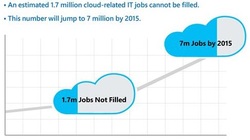Cloud Skill Demand Exceeding Available Worker Supply

The results of a study by Microsoft and IDC called Climate Change: Cloud's Impact on IT Organizations and Staffing stated that in 2012, over 1.7 million cloud-related jobs went unfulfilled. The study also predicted that over the next few years millions more will go unfulfilled. The reason- the demand for workers with cloud-related skills is increasing rapidly; however, the pool of workers with cloud-related skills is lacking severely. The most difficult positions to fill, according to the study, are those requiring high-level cloud skills including building migration plans and assessing the risk of a cloud transition.
"We're seeing cloud technology move beyond the realm of curiosity, beyond early experimentation, and into a second- or third-stage technology evolution," says Carolyn April, CompTIA's Director of Industry Analysis. "Up until this year, we'd seen a gradual increase in adoption and acceptance, but this year we saw a huge spike in adoption, and that's a game-changer for business."
Demand is high for cloud skills
Businesses seem to focusing on workers that have the cloud-related skills to help the company migrate to the cloud, or workers that can integrate cloud technology with the company's existing systems.
Seth Robinson, CompTIA's Director of Technology Analysis, states that "Companies are looking for folks with the knowledge of how to integrate cloud solutions with existing, on-site systems. Migration, integration, developer knowledge of different cloud providers' application programming interfaces (APIs), are all skills that are in high demand. At this point in the cloud technology evolution, firms have a diverse set of options to build out their architecture that includes both cloud tech and on-site solutions."
According to research on recruiter searches, the demand for Amazon Web Services skills, open source, and DevOps engineers are among the top cloud skills currently in demand.
"There's definitely a vendor preference -- experience working with Amazon Web Services is sought in nearly half of all searches. Open source, too, is hot; from Linux to configuration management systems like Chef and Puppet to programming languages like Python, Perl and Ruby. These fall into the category of 'cloud-adjacent' technologies," says Howard Lee, architect of the talent sourcing solution Open Web.
Demand for these skills seem to be a sign of a major shift in the entire cloud computing industry. The demand for integration, migration and API-related skills show how cloud computing is evolving past specific departments, and how it is affecting companies as a whole.
"The overarching emphasis is on the connection between the technology and business. The tech team isn't just responsible for choosing tech (cloud or otherwise) for one particular department or project, but for an entire line-of-business. IT professionals have to be able to think 'big picture,' strategically, and to see how the cloud impacts many aspects of the company," Robinson says.
Seth Robinson, CompTIA's Director of Technology Analysis, states that "Companies are looking for folks with the knowledge of how to integrate cloud solutions with existing, on-site systems. Migration, integration, developer knowledge of different cloud providers' application programming interfaces (APIs), are all skills that are in high demand. At this point in the cloud technology evolution, firms have a diverse set of options to build out their architecture that includes both cloud tech and on-site solutions."
According to research on recruiter searches, the demand for Amazon Web Services skills, open source, and DevOps engineers are among the top cloud skills currently in demand.
"There's definitely a vendor preference -- experience working with Amazon Web Services is sought in nearly half of all searches. Open source, too, is hot; from Linux to configuration management systems like Chef and Puppet to programming languages like Python, Perl and Ruby. These fall into the category of 'cloud-adjacent' technologies," says Howard Lee, architect of the talent sourcing solution Open Web.
Demand for these skills seem to be a sign of a major shift in the entire cloud computing industry. The demand for integration, migration and API-related skills show how cloud computing is evolving past specific departments, and how it is affecting companies as a whole.
"The overarching emphasis is on the connection between the technology and business. The tech team isn't just responsible for choosing tech (cloud or otherwise) for one particular department or project, but for an entire line-of-business. IT professionals have to be able to think 'big picture,' strategically, and to see how the cloud impacts many aspects of the company," Robinson says.
Related articles
- Demand for Cloud Skills Still Outpaces Supply of Workers (networkworld.com)
- CompTIA Brings Out Cloud Adoption Research (hispanicbusiness.com)
- IT Channel Firms Navigate Cloud Business Models, CompTIA Research Reveals (hispanicbusiness.com)
- In a world of mobile and cloud technologies, do IT certifications still matter? (venturebeat.com)
- All Covered Helps Construction Firm, Aspire Design, Inc. Leverage Cloud Computing (hispanicbusiness.com)
- Study portrays Microsoft's cloud computing in China as potential U.S. security threat (geekwire.com)
- How Cloud Computing Changes Almost Nothing (fool.com)
- AWS and DevOps Skills in High Demand, says Dice (datacenterknowledge.com)
- The Next Wave of Cloud (business2community.com)
- Oak Investment Partners Leads $5 Mln Round for Cloud Technology (pehub.com)

 RSS Feed
RSS Feed
